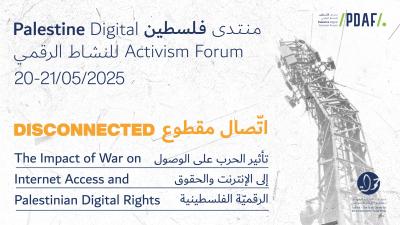Palestine Digital Activism Forum 2025
The urgency of safeguarding digital rights, including the right of access to the internet and information, has never been more pressing. As this harrowing reality unfolds, it is important to emphasize the fundamental human rights that underpin digital access including the right to internet access, the right of access to information, and freedom of assembly online, among many others.
Disconnected: The impact of war on internet access and Palestinian digital rights
This year’s Palestine Digital Activism Forum occurs as Gaza lays in the rubble. We are witnessing an increasingly dire humanitarian situation amidst the genocidal violence unfolding in Gaza. The urgency of safeguarding digital rights, including the right of access to the internet and information, has never been more pressing. As this harrowing reality unfolds, it is important to emphasize the fundamental human rights that underpin digital access including the right to internet access, the right of access to information, and freedom of assembly online, among many others.
Access to the internet is increasingly recognised as a crucial right that allows individuals to exercise other fundamental human rights. Article 19 of the Universal Declaration of Human Rights declares that the promotion, protection, and enjoyment of human rights on the Internet must be safeguarded. Internet access facilitates knowledge sharing, social networking, political organization, and economic engagement. With this in mind, the Palestine Digital Activism Forum 2025 will explore the essential role digital rights play in enabling individuals to share their experiences, seek justice, and advocate for human rights, especially during times of war.
Over the past year and a half, the situation in Gaza has worsened drastically, marked by the collapse of essential services and widespread destruction. With communication lines severed, the people of Gaza have been deliberately cut off from the outside world, unable to communicate, share their stories, access news, or even call for help. They cannot document war crimes and atrocities, leaving them voiceless. Economic opportunities, heavily reliant on digital platforms, are crippled, and the already fragile economy faces further devastation.
The ongoing genocidal war in Gaza has inflicted catastrophic damage on the Gaza Strip’s telecommunications infrastructure, effectively isolating it from the world. This disconnection has disrupted access to vital information, emergency services and safety updates, stifled freedom of expression, and hindered emergency response efforts. With at least 75% of mobile infrastructure damaged and the fiber optics backbone severely compromised, only about 25% of the infrastructure remains operational in certain areas. The estimated monetary cost of this destruction is around $90 million, excluding damage to underground facilities.
The interruption of telecommunication services has left civilians without access to the few remaining reliable electronic sources of information such as online media and messaging platforms. This has been exacerbated by the shutdown of local broadcasting stations, restrictions on international journalists, and the killing of at least 137 journalists since the war began according to the Committee to Protect Journalists. Telecommunications blackouts have severely affected daily life, preventing individuals from reaching emergency and rescue services and contributing to an increased death toll due to communication delays. Humanitarian organizations have struggled to operate, while civilians are unable to contact relatives during the crisis, and experience immense psychological distress. Furthermore, deplatforming efforts across digital payment platforms has blocked critical donations to humanitarian aid, while also crippling everyday Gazans ability to access lifesaving funds sent by loved ones abroad.
Additionally, major online platforms have limited Palestinians access by censoring their voices and suppressing their online presence. As the war on Gaza intensified, online platforms repeatedly restricted content from Palestinian journalists and media outlets, in addition to citizens who were actively documenting and posting essential firsthand information on the violations. These platforms’ have shown a bias against the voices of marginalized communities through their content moderation policies, resulting in the silencing of vital testimonies, which has limited the global understanding of what is taking place in Gaza. This suppression violates fundamental digital rights, which are particularly crucial in conflict zones, including freedom of expression and the right to information, further exacerbating the isolation of Palestinians during this dire situation.
Palestinians increasingly restricted access to digital services over the last year and a half highlight the importance of advocating for the restoration of digital access and safeguarding of digital rights as Restoring digital access would allow Palestinians to coordinate aid, document violations, and connect with loved ones, all essential for resilience and survival.
Find out more about the event here.

